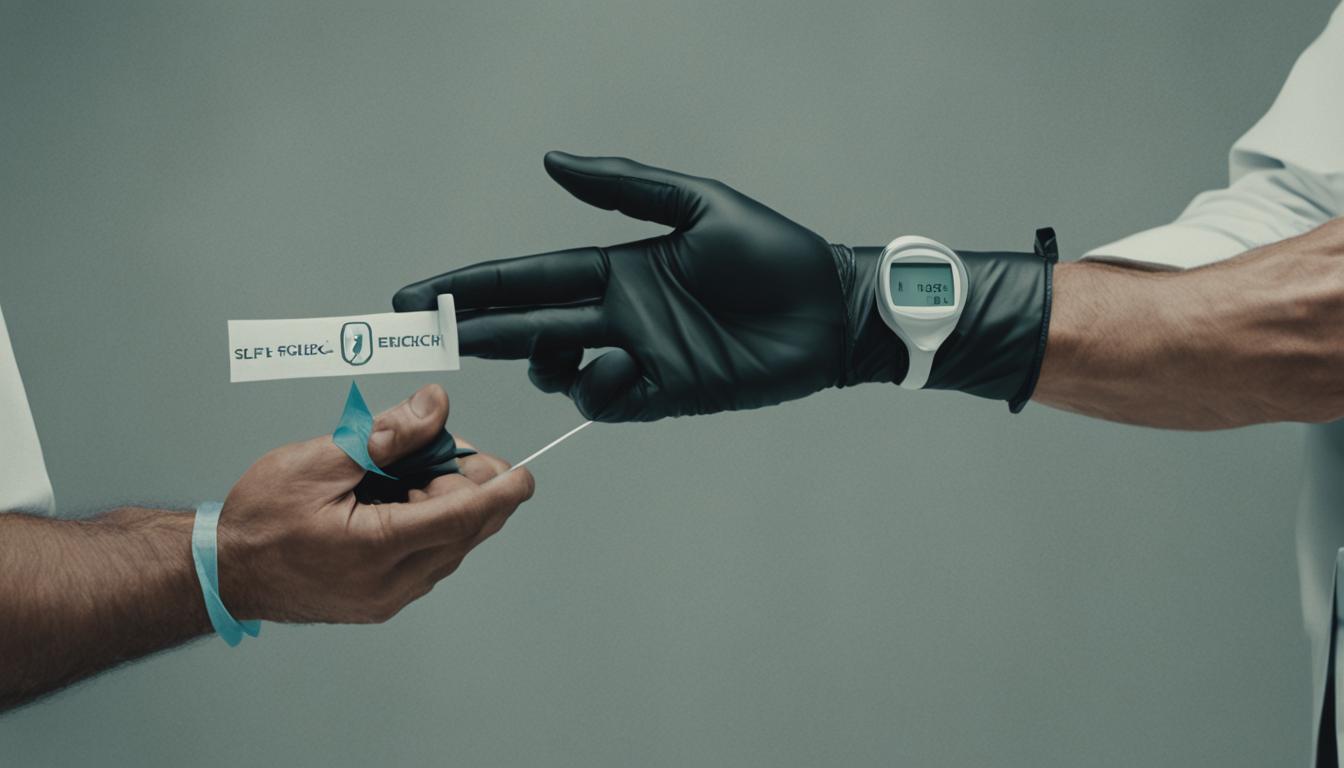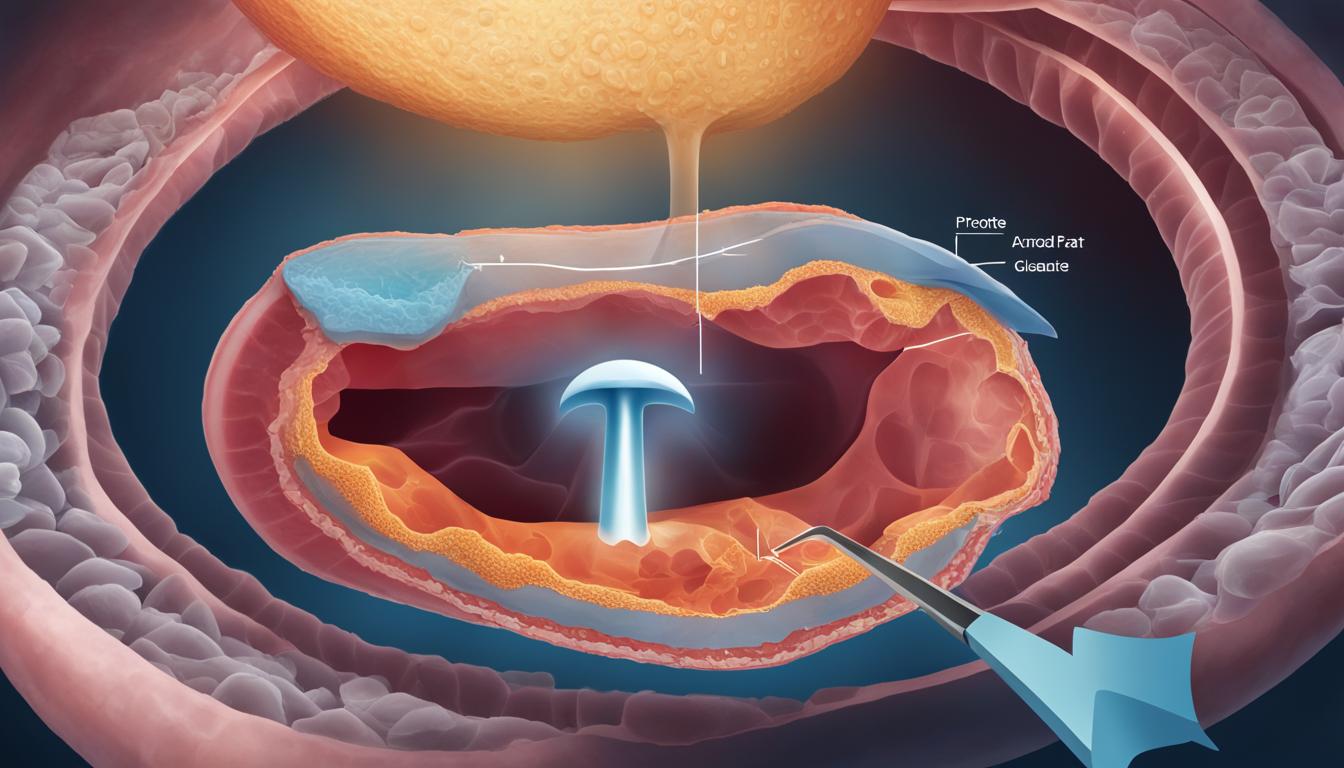Prostate cancer is a prevalent concern for many men today. The question often arises: Can you check yourself for prostate cancer?
While it’s natural to want to take charge of your health, self-examination for prostate cancer is not recommended. The accurate assessment of prostate health requires the expertise of skilled professionals. Attempting a self-examination can potentially cause harm and lead to inaccurate results.
To detect prostate cancer, regular screenings such as a digital rectal exam (DRE) and a PSA blood test are essential. These screenings are performed by healthcare professionals who can accurately assess your prostate health and determine if further diagnostic tests are necessary.
Key Takeaways:
- Self-examination for prostate cancer at home is not recommended.
- Regular screenings like the DRE and PSA blood test are crucial for early detection.
- Professional assessments ensure accurate results and prevent potential harm.
- Consult a healthcare professional for proper evaluation and diagnosis of prostate health.
- Do not rely solely on self-examinations; they may not provide a comprehensive understanding of your prostate health.
Understanding Prostate Cancer Symptoms
Prostate cancer is a complex disease, and its symptoms can vary from person to person. While some individuals may not experience any noticeable symptoms, others may have specific signs that they should not ignore. Regular screenings are crucial in detecting prostate cancer, but it’s essential to be aware of the common symptoms associated with this condition.
When prostate cancer symptoms do occur, they can include:
- Frequent urination: This is characterized by a need to urinate more often, especially during the night.
- Weak urinary stream: A weak or interrupted urinary stream is another potential symptom of prostate cancer.
- Pain or burning during urination: Some individuals may experience pain or a burning sensation while urinating.
- Blood in the urine or ejaculate: Finding blood in the urine or ejaculate can be a cause for concern and should be addressed promptly.
- Bone pain: Prostate cancer can spread to the bones, causing pain in areas such as the hips, ribs, or back.
- Back pain: Unexplained back pain, especially in the lower back, can be a sign of advanced prostate cancer.
It’s important to note that these symptoms can also be indicative of other prostate conditions. Therefore, it is crucial to consult a physician for proper evaluation and diagnosis. They will conduct the necessary tests and examinations to determine the underlying cause of the symptoms and provide the appropriate course of action.
If you experience any of these symptoms or have concerns about your prostate health, do not hesitate to reach out to a healthcare professional. Early detection and intervention can significantly improve outcomes and increase the chances of successful treatment.
Screening Methods for Prostate Cancer
When it comes to detecting prostate cancer, there are two main screening methods that healthcare professionals rely on: the digital rectal exam (DRE) and the PSA blood test.
The DRE is a simple and safe procedure performed by a physician. During this exam, the doctor inserts a gloved and lubricated finger into the rectum to feel for any abnormalities in the prostate. While it may sound uncomfortable, the DRE is a quick and painless procedure that allows the doctor to assess the size, shape, and texture of the prostate.
However, it’s important to note that the DRE cannot examine the entire prostate. That’s where the PSA blood test comes in. This test measures the levels of prostate-specific antigen, a protein produced by the prostate gland, in the blood. Elevated PSA levels can be indicative of prostate cancer, although it’s important to remember that other factors, such as age and certain medications, can also affect PSA levels. Therefore, it’s crucial to interpret the results in consultation with a healthcare professional.
H3: The Importance of Regular Screening
Regular screenings, consisting of both the DRE and PSA blood test, are vital for early detection and appropriate monitoring of prostate cancer. It is generally recommended that men between the ages of 40-50 should start regular screenings, especially those at higher risk for prostate cancer.
The combination of the DRE and PSA blood test provides a more comprehensive picture of prostate health, allowing healthcare professionals to detect any potential abnormalities and begin appropriate interventions if necessary. By staying proactive with regular screenings, men can take control of their prostate health and potentially catch any issues at an early stage.
| Screening Method | Procedure | Advantages | Considerations |
|---|---|---|---|
| Digital Rectal Exam (DRE) | The doctor inserts a gloved and lubricated finger into the rectum to feel for abnormalities in the prostate. | – Quick and safe procedure – Provides information about the size and shape of the prostate |
– Cannot examine the entire prostate – Requires regular screenings |
| PSA Blood Test | A blood sample is taken to measure the levels of prostate-specific antigen in the blood. | – Measures PSA levels, which can indicate the presence of prostate cancer – Helps in monitoring prostate health over time |
– Elevated PSA levels can also be caused by other factors – Interpretation should be done in consultation with a healthcare professional |
It’s important to remember that the screening methods for prostate cancer are just the first step in the diagnostic process. If any abnormalities or elevated PSA levels are detected, further diagnostic tests, such as a biopsy, may be necessary to confirm or rule out prostate cancer.

Can You Check Yourself for Prostate Cancer at Home?
It is strongly advised against attempting to check yourself for prostate cancer at home. Self-examinations require the expertise of licensed medical professionals to accurately assess prostate health and avoid potential harm. While self-testing is not recommended, there are other ways to monitor your prostate health between regular screenings. Maintaining a healthy diet, exercising regularly, and paying attention to any changes in urinary or genital health can help you stay vigilant and proactive in maintaining your prostate health.
In addition to regular screenings performed by healthcare professionals, there are proactive steps you can take to ensure the well-being of your prostate. Consider the following tips:
- Eat a balanced diet rich in fruits, vegetables, whole grains, and lean proteins.
- Limit the consumption of red and processed meats.
- Avoid excessive alcohol consumption.
- Engage in regular exercise, such as brisk walking, swimming, or cycling.
- Maintain a healthy weight.
- Quit smoking if you are a smoker, as it has been linked to an increased risk of aggressive prostate cancer.
- Manage stress through relaxation techniques like meditation or deep breathing exercises.
Remember, while these lifestyle choices can contribute to overall prostate health, they are not a substitute for regular screenings and consultations with healthcare professionals. It is crucial to prioritize your health and address any concerns promptly. By staying informed and taking preventive measures, you can play an active role in maintaining your prostate health.
Prostate-Healthy Foods
Some foods have been associated with promoting prostate health. Consider incorporating the following into your diet:
| Foods | Benefits |
|---|---|
| Tomatoes | Rich in lycopene, which may help reduce the risk of prostate cancer |
| Cruciferous Vegetables (e.g., broccoli, cauliflower, and Brussels sprouts) | Contain substances like sulforaphane, which may have anticancer properties |
| Fatty Fish (e.g., salmon, trout, and sardines) | Provide omega-3 fatty acids, which have been linked to a lower risk of aggressive prostate cancer |
| Greek Yogurt | High in protein and calcium, promoting overall health |
| Green Tea | Possesses antioxidants that may have potential protective effects against prostate cancer |

“Regular screenings performed by healthcare professionals are essential for early detection and proper diagnosis. By staying informed and taking preventive measures, you can play an active role in maintaining your prostate health.”
While self-examinations are not recommended, it’s important to be proactive about your prostate health. Maintain a healthy lifestyle, be aware of any changes in urinary or genital health, and schedule regular screenings and conversations with your healthcare provider. Your health is invaluable, and taking care of your prostate is a crucial aspect of overall wellbeing.
Conclusion
When it comes to prostate health, it’s important to prioritize regular screenings performed by healthcare professionals. While attempting self-examinations for prostate cancer at home is not recommended, there are other proactive steps you can take to maintain optimal prostate health.
First and foremost, familiarize yourself with common prostate cancer symptoms, such as frequent urination, weak urinary stream, and blood in urine. If you experience any of these symptoms or notice any changes in your urinary or genital health, it’s crucial to report them to your physician for further evaluation.
In addition to regular screenings and symptom awareness, adopting a prostate-healthy lifestyle can significantly contribute to your overall prostate health. Incorporating a balanced diet rich in fruits, vegetables, whole grains, and lean proteins can provide essential nutrients that support a healthy prostate. Engaging in regular physical activity, such as brisk walking, swimming, or cycling, is also beneficial for prostate health.
Remember, proactive prostate care involves regular consultations with healthcare professionals and adherence to screening guidelines. By prioritizing screenings, staying vigilant about symptoms, and maintaining a healthy lifestyle, you can take control of your prostate health and reduce the risk of complications. Your prostate health matters, so let’s take charge together!
FAQ
Can I check myself for prostate cancer at home?
It is strongly advised against conducting self-examinations for prostate cancer at home. Regular screenings and consultations with a physician are essential for early detection and proper diagnosis.
What are the symptoms of prostate cancer?
Prostate cancer symptoms can include frequent urination (especially at night), a weak urinary stream, pain or burning during urination, blood in the urine or ejaculate, bone pain in the hips, ribs, or back, and back pain. It’s important to consult a physician for proper evaluation and diagnosis.
What are the screening methods for prostate cancer?
The two main screening methods for prostate cancer are the digital rectal exam (DRE) and the PSA blood test. The DRE is performed by a physician, and the PSA test measures levels of prostate-specific antigen in the blood.
Can I perform a self-examination for prostate cancer at home?
Self-examinations for prostate cancer at home are not recommended. They require the expertise of licensed medical professionals to accurately assess prostate health and avoid potential harm.
What are some proactive measures for prostate health?
Maintaining a healthy diet, exercising regularly, and paying attention to any changes in urinary or genital health can help you stay vigilant and proactive in maintaining your prostate health. Regular consultations with a healthcare professional and adherence to screening guidelines are also important.



